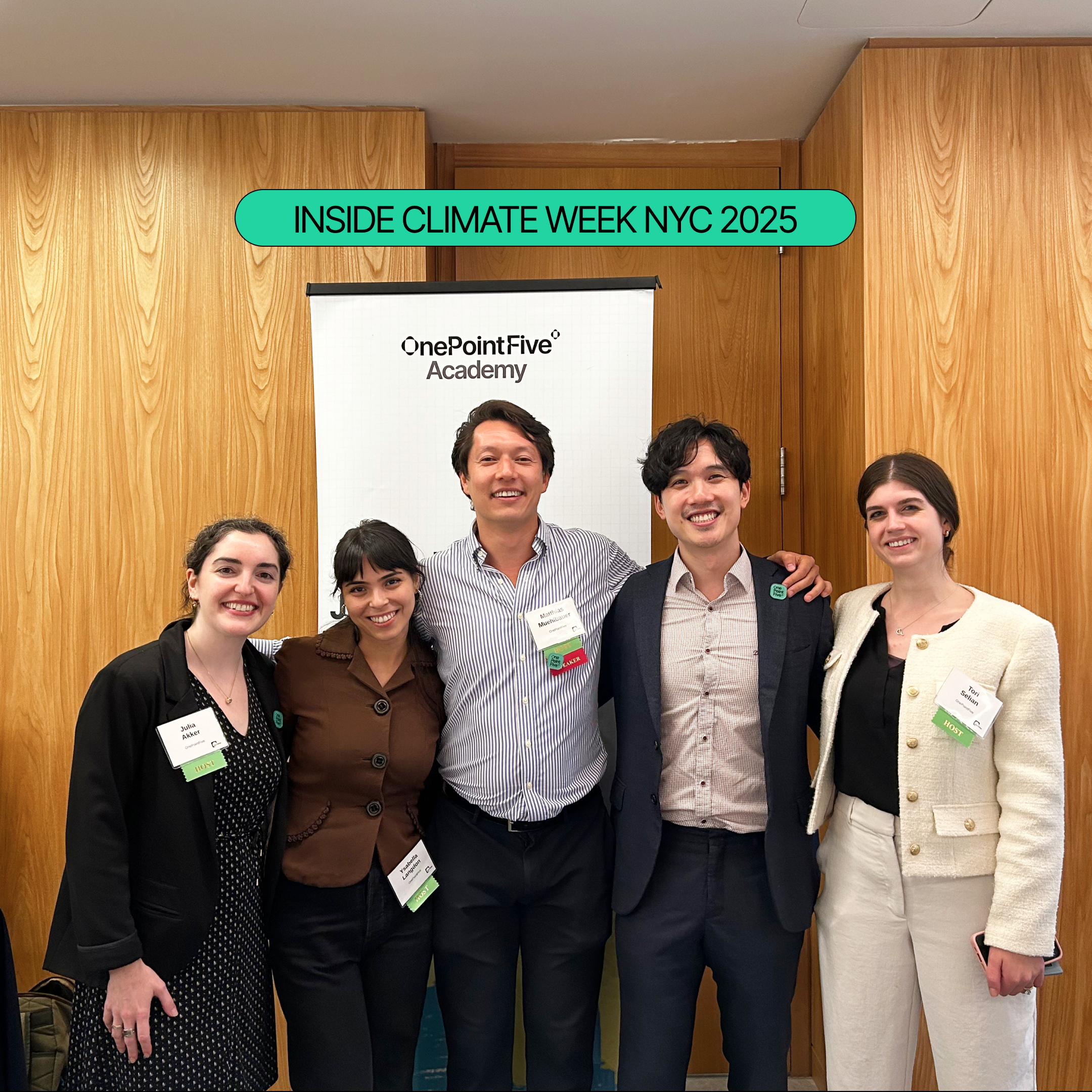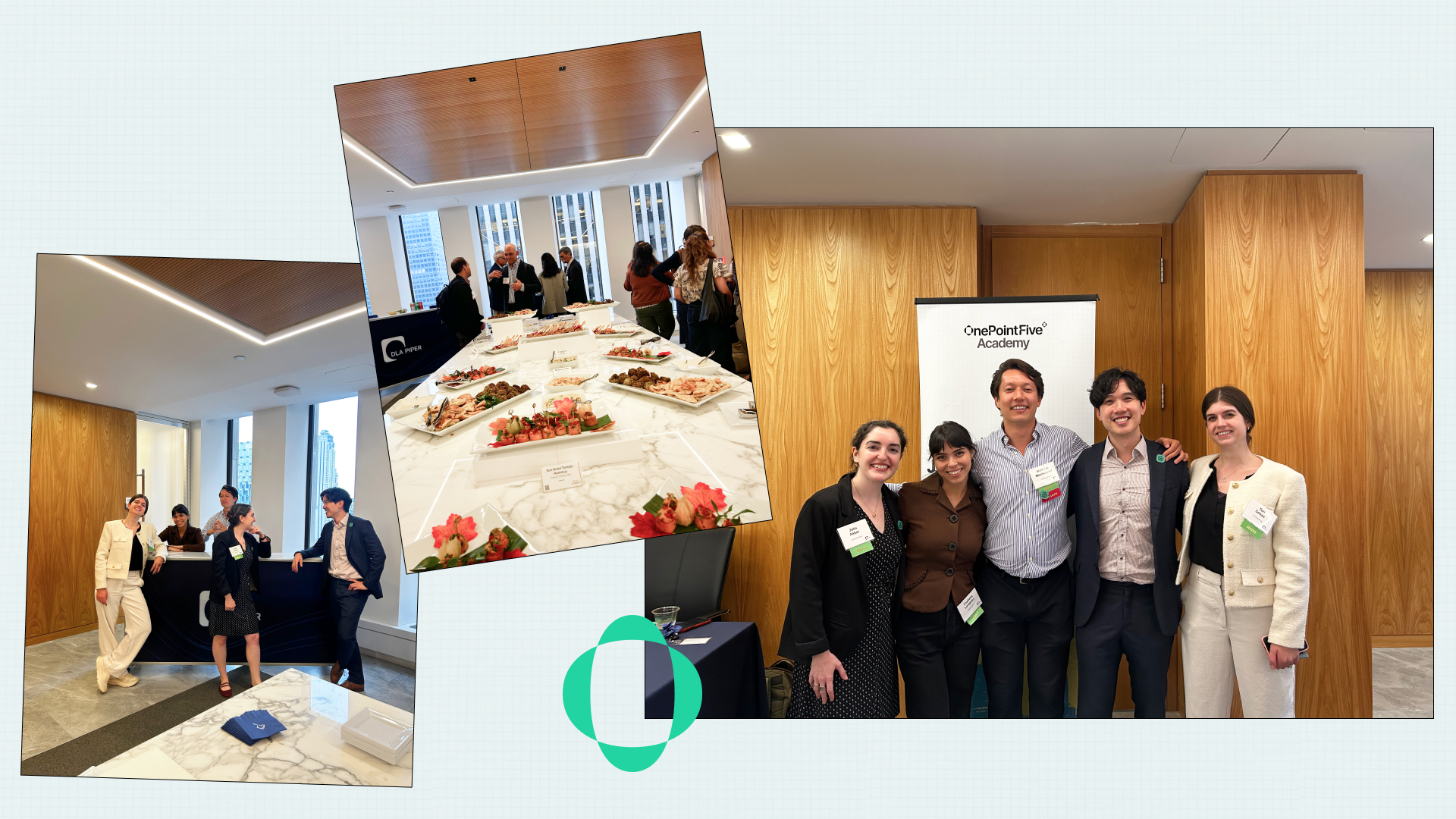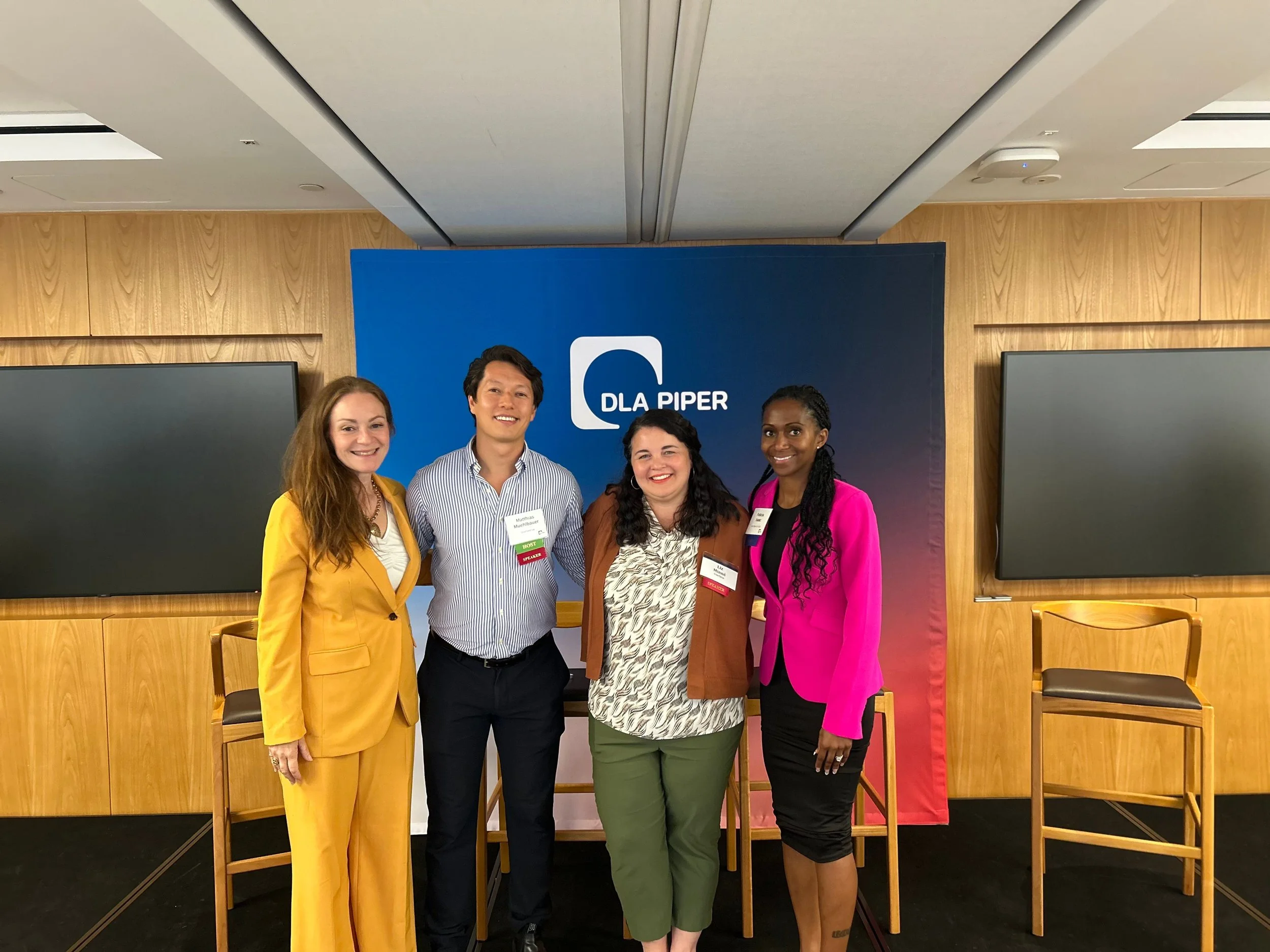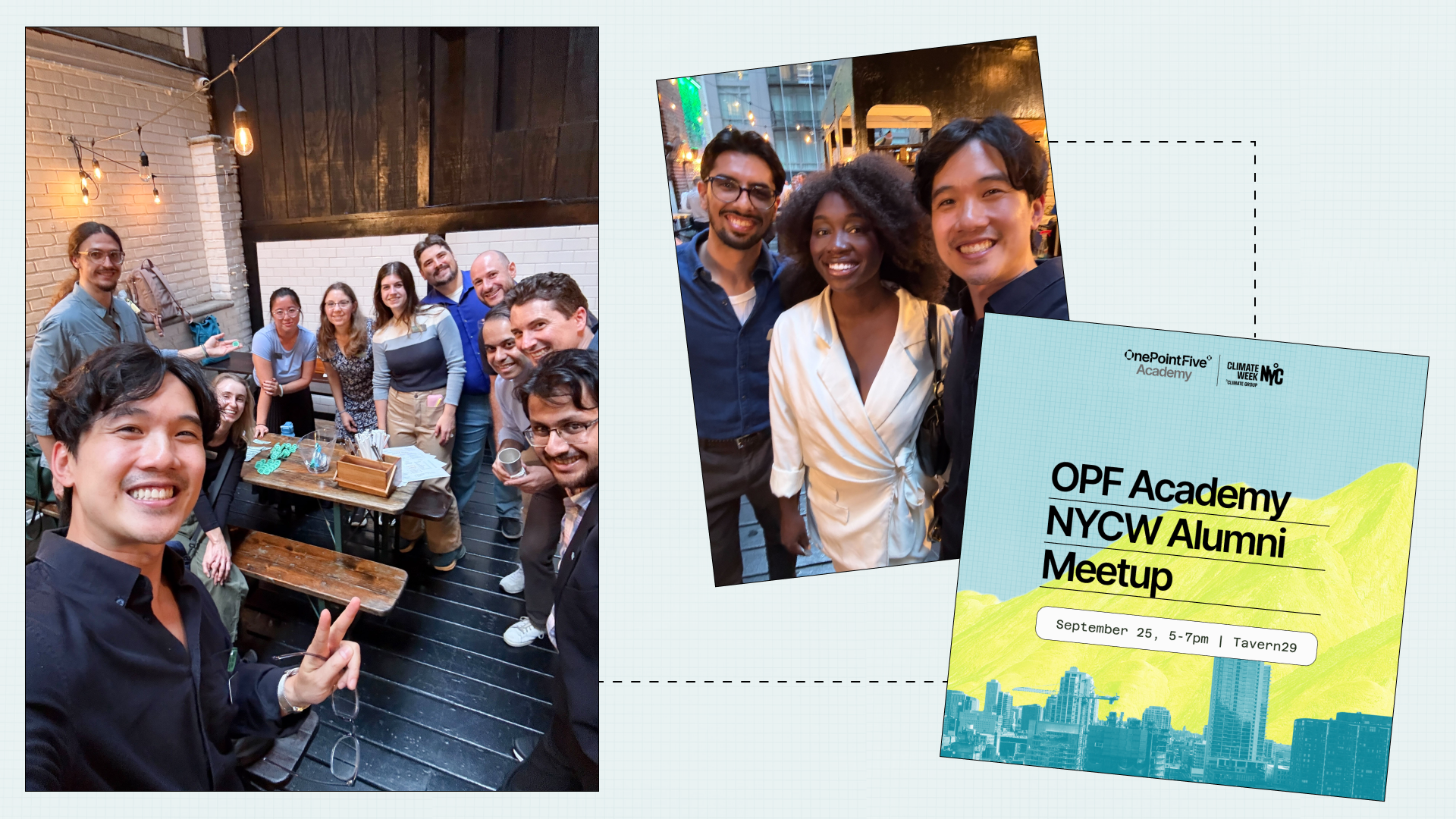NYCW Key Insights and Takeaways from OPF team
From September 21–28, New York City hosted the world’s largest climate gathering outside COP. Stages, boardrooms, and community spaces across the city were filled with discussions, announcements, and initiatives driving real-world climate action.
For OnePointFive, it was an important moment to listen, contribute, and connect. We co-hosted a executive panel with global legal firm DLA Piper on “Beyond Compliance: Turning Legal Obligations into Competitive Edge”, where leaders from Interface, DLA Piper, and UN Global Compact Network USA shared strategies on ESG regulations and greenwashing litigation. We also welcomed our growing community at the OPF Academy Alumni Meetup, where members from different cohorts came together to reconnect, meet other fellow alumni, and exchange ideas.
Beyond our own hosted events, our team spread out across the city, joining conversations and bringing back new insights. Here are their reflections in their own words:
Neil Yeoh, Founder & CEO
At the start of our OPF insights workshop, Neil posed a simple question: “How many of you have taken one of our trainings?” Nearly half the room raised their hands.
“That moment stuck with me,” Neil reflected. “It was proof that our work matters, that there’s still a deep hunger to upskill, and that we’ve built real trust as a calm, calming authority in what feels like a turbulent time.”
Neil’s week was shaped by both familiar faces and new perspectives. He reflected on the value of reconnecting with partners and peers while also celebrating progress: “Seeing our long-term partners announce their first ever Scope 1, 2 and 3 emissions baseline, which we’ve been supporting on, and becoming the first North American engineering society to share their emissions results — well done ASME!”
Neil also mentioned how meeting OPF Academy alumni during the week gave him renewed energy: “I came into the week feeling burnt out. Talking with alumni and hearing how they’ve applied what they learned reminded me of the impact and connections we’ve forged.”
“Yes, we need to do the work, not just talk about it. But being in the room together matters. We draw energy, ideas, and resilience from one another. Even if the messages aren’t new, showing up sends a clear signal that we’re still here; we’re still fighting; and we’re not going anywhere.”
Matthias Muehlbauer, Co-Founder & COO
Matthias valued the opportunity to moderate our co-hosted panel with DLA Piper, guiding a conversation that included insights of almost three decades of decarbonization (by Liz Minné, Head of Global Sustainability Strategy at Interface), new approaches to transparency without greenwashing (by Felicia Isaac, Sustainability Attorney and Associate at DLA Piper), and reflections from the ex-Head of ESG at Meta (by Amanda Gardiner, Executive Director at UN Global Compact Network USA.)
In the photo: Matthias Muehlbauer with Liz Minné (Interface), Felicia Isaac (DLA Piper), and Amanda Gardiner (UN Global Compact Network USA)
A source of inspiration came from Alex Honnold, the climber and star of Free Solo, who shared stories from the Honnold Foundation. “They provide funding for rural communities to build solar as a way for communities to be empowered, to reduce their living costs, where half of their costs go to diesel and gasoline to power their communities, and provide stewards of these communities the adequate resources to protect the natural environment.”
Despite a challenging political landscape, Matthias saw persistence everywhere: “What will prevail are the economics of renewables, the herculean efforts of climate startups that are reducing friction in all parts of the climate solutions ecosystem, and the persistence of entrepreneurs, sustainability experts with the courage to lead. Underpinning all of that, are the communities, such as our very own OPFA community, that keep hope alive, collaborate alongside each other, and collectively act.”
Julia Akker, Associate Director
For Julia, NYCW was a chance to find fresh perspectives on climate. She prioritized events that could spark new ideas, and left with insights that surprised her: "At a panel on Sustainable Travel, Tourism, and Hospitality hosted by Cornell Tech, I was surprised to learn that packaging is actually the biggest potential for mitigation in the beverage industry. For wine in particular, reducing the weight of glass bottles could significantly reduce the transportation footprint. I’m excited to see what kind of glass emerges from the R&D in this space!”
She also explored circular solutions in construction, such as mass timber (underutilized option with a lower footprint compared to traditional steel beams), and rediscovered the potential of tidal wave energy at a robotics and AI panel (AI and Robotics for Good, hosted by Viam), often underfunded due to bureaucratic barriers hindering progress and testing: "Coincidentally, the day after the panel, I was delighted to read about the first onshore wave energy project in the U.S. being launched by the Port of Los Angeles!”
"Despite regulatory setbacks, cut budgets, and the feeling of being attacked on all sides in the US, this year’s NYCW reminded of what excites me most about working in climate in the first place — at its core, it promotes innovation and ingenuity, and constant learning — and this is what gives me energy to continue the good fight.”
Victoria Thompson, Senior Associate
For Victoria, her standout event was the "Financing for USA Adaptation Investments due to Climate Change," hosted by Fordham University and FIASI (Fixed Income Analysts Society, Inc.), that connected finance with resilience: "The conference focused on climate change's impact on municipal bonds and how to better align climate resilience with municipal bond drivers. It was fascinating to learn about the importance of municipal bonds to our communities. There needs to be more emphasis and conversations on this topic since this financing mechanism will be "hit first and worst" by extreme weather events, often with less of a safety net compared to federal-level financing.”
Another highlight was the OPF Academy alumni happy hour. “The turnout was fantastic, the highlight for me was connecting with the two attendees who organize monthly get-togethers for the cohorts! It was really cool to learn there is a passionate, thriving community meeting regularly outside of our events and showcased the program's lasting impact.”
Despite the political noise, Victoria’s biggest takeaway was hope: “While the week was punctuated by our president saying “the carbon footprint is a hoax made up by people with evil intentions” at the UN, it was inspiring to see so many people remain hopeful about the future. The 2025 NYCW demonstrated just how many dedicated people and groups are committed to creating a cleaner, healthier planet. Can't wait for next year!”
What we’re taking away from Climate Week 2025.
NYC Climate Week 2025 wasn’t easy, and neither has been this year for sustainability work. Political pushback, regulatory uncertainty, and budget cuts have made progress harder to achieve.
And yet, amid political tension and funding challenges, this year’s Climate Week also showed something important: the determination to keep moving forward. In conversations about compliance and leadership, in alumni reconnecting, and in new insights on climate innovation, the week reminded us that progress is built step by step when people share knowledge and commit to action.
For us at OPF, the lesson is that climate work may be under strain, but it is not standing still. It adapts, evolves, and continues through the commitment of people and communities who refuse to let setbacks define the outcome.




